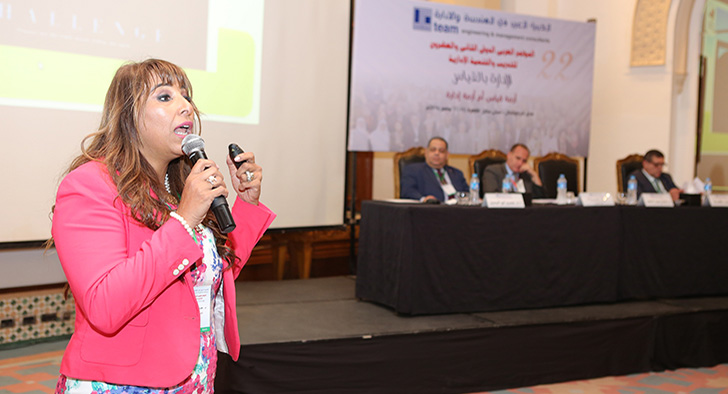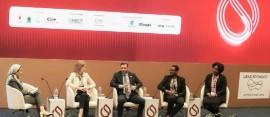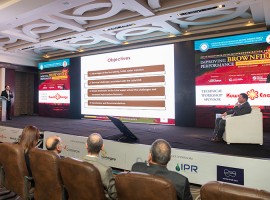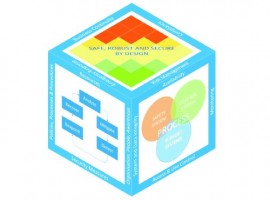Egypt Oil&Gas had a pleasure of participating in Team Misr’s 22nd annual conference on Training and Administrative Development held in Cairo in November with the presence of the Sudanese State Minister
of Human Resource Development, Dr. Adam Abdallah Al Nour.
Oil and gas industry, like any other business, operates in an ever changing environment and under the stress of increased competition. It is therefore imperative for companies to establish via-ble policies to govern their internal development of human capital, stated Chairperson and General Manager of Team Misr (TEAM), an Egyptian independent engineering and management consultancy firm, Dr. Helmy Sallam.
In the wake of these challenges, the TEAM’s 2016 conference focused on a crucial aspect of human development, namely Measurement Based Management. It sought to tackle the timely relevance of management vs. measurement and it also addressed other urgent human development issues in the industry.
The conference brought together Human Resource Management (HRM) experts from the Arab region to discuss topics ranging from the concept of measuring effective management to human capital development to systems used in measuring organizational and individual performance.
Management Effectiveness
The MENA region is known to lag behind in general management effectiveness as well as in applying global trends in performance and people management, according to some experts.
“Egypt and the Arab region suffer from a crisis of management. There are fundamental and essential aspects that haven’t been implemented,” Dr. Nabila A. El Shall, TEAM’s Deputy Chairperson and Director at the Arab Center for Women in Development said in an interview with Egypt Oil&Gas. Yet, “there are various frameworks and models to measure intangible factors such as job satisfaction and employee engagement.” Therefore, the role of the involved entities is “to adapt these models to our Arabic culture and adopt them as managerial habits to drive continuous improvement,” Dr. El Shall noted.
Embracing Generational Gap
Overcoming generational gap is one of the models that need to be revisited in the region. Experts at the conference have identified the gap as a major factor in human capital development and stressed that there exist managerial mechanisms designed to tackle this issue. These would need to be incorporated into the present structures and processes within the industry.
At the conference, TEAM’s Primary Expert and Consultant for Human Resource Development, Dr. Medhat Moustafa Ragheb, presented a managerial model that aims to integrate senior and junior employees in companies through transformational methods in order to achieve a harmonious effect within an organization that will help it accomplish its objectives. In this way, senior generations will be able to transfer their expertise to younger employees more efficiently.
In doing so, companies should pay particular attention to young talents. Younger generations, have, in fact, different requirements, noted Dr. Hanan Abd El Moniem, Midor’s HR Executive General Manager: “Junior staff are tenacious. Therefore, we need to fix this young generation. We need to understand their motivations and needs in order to best utilize their capabilities.” As she noted further there is an immediate need to “create a win-win situation between junior staff and senior management.”
Speaking about the organizational development difficulties in the Egyptian oil and gas sector in particular, Dr. Ragheb told Egypt Oil&Gas that “the primary challenge is the organizational culture and management’s conviction about change. Oil and gas leadership should support change and eliminate barriers to organizational development. This will facilitate the transformational process,” which is much needed in the current market conditions.
It is no doubt that there is a massive potential and human capacity present in the country to achieve this. As Dr. Ragheb stressed, the oil sector employs the best human minds in Egypt. It is, therefore, possible for them to champion monumental changes for the entire country.
Future Leaders in Petroleum Sector
These changes can become real through continuous efforts in people development programs, most significantly through Future Leaders education. In line with this strategy, Egypt’s Middle East Oil Refinery (Midor) and Tharwa Petroleum Company have built up a joint training scheme both for future leaders and other employees with a goal to better face challenges ahead and to absorb changes as the situation requires. Added value of this initiative is that it helped the companies to reduce their overall training budgets.
As the program revealed, in order to manage change, it was crucial to first shift employees’ paradigms about teamwork and cooperation, emphasized during her presentation Dr. Abd El Moniem from Midor. Furthermore, the program has adopted an inclusive approach for all attendees to best achieve intended outcome of building integrated and complex managerial structures. “We didn’t rely on training, but on workshops to encourage attendees’ participation in the learning process. As a result the trainees became our partners in success.”
Dr. Abd El Moniem added that key factor to this joint initiative was “the commitment of top management in both companies, Midor and Tharwa.”
Competency Mapping
Competency mapping is another important aspect of developing capable human capital. The initial step is to identify required level of skills for company’s business objectives, measure employees’ competency levels, and then highlight gaps in the as-is. Companies can then work on addressing these skill gaps through training and development programs.
For the Egyptian oil and gas industry specifically, “it would be very easy and quite beneficial to develop such a map, because the technical competencies for engineering position, for example, will be the same across different petroleum companies,” according to TEAM’s Expert in Administrative Development, Dr. Walid Abdallah Kamal. He added that the oil and gas sector will benefit in the form of “identifying where there are competency gaps. Therefore the sector can focus on building this skill through training and development programs.”
Undoubtedly, “the competency map is a useful tool as an inventory of skills within the sector, from which second line management can be sourced.”
This can be facilitated through a unified competency dictionary for Arabic nations. The MENA region could benefit from it greatly. TEAM’s Chairman, Dr. Helmy Sallam, further elaborated say-ing that such “competency dictionaries must align to the organization’s strategy in order to be effective.”
Lessons from Sudanese Performance Assessment
Business entities are further eager to revamp Performance Assessment system, as participants agreed, having learned from the Sudanese experience.
Advisor to the Sudanese Minister of Oil, Dr. Mohie El Din Nayeem Mohammed Saeed, presented a case study on the Sudanese Petroleum Corporation (SCP) and its efforts to move from a confidential one-directional appraisal procedure to a more inclusive transparent method.
During the discussion panel, Dr. Saeed stressed the importance of including the employee in the appraisal process and providing constructive feedback on performance, which as the case of SCP shows, helped the company to improve its output. As he eloquently noted, “improvement has no end, it is a cycle” that can be enabled by feedback loops.
The transparency of the new system was an important key success factor as praise for positive behavior and improved performance was done publicly, thus encouraging others to do better. Yet, reprimand for undesirable behavior and declined performance was done privately to provide feedback to the employee in a safe and judgment free atmosphere.
Dr. Saeed concluded that the fundamental challenge in the Arab region is developing second line managers. “We should assess managers based on whether or not they created a real second line. This will enable the region to accumulate truly developed human capital.”
In Egypt, the sector’s competence “is evident in the fact that it was resilient in facing the difficulties of previous years with all the challenges. Therefore, it is a primary candidate to implement organizational development within Egypt,” as Dr. Ragheb convincingly stated.
Hence, given the Egyptian industry’s resilience, it appears that there never been a more suitable time to embrace the potential and capacities in human capital development in the country. With the present economic challenges Egypt is facing, the time is ripe to start drawing on the existing and innovative models. This active approach promises to effectively and efficiently incorporate all essential elements of people capital development for the benefit of the entire country.








